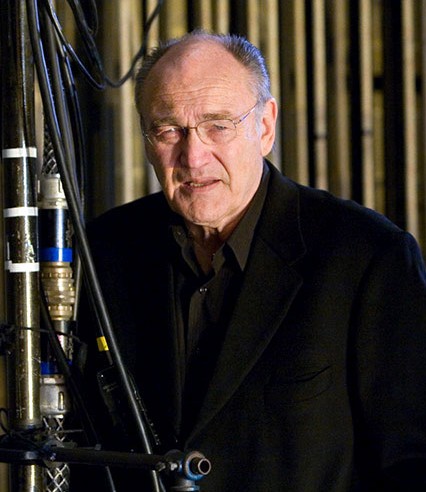Professor Emeritus David Bathrick dies in Germany at 84
By Daniel Aloi
Beloved emeritus professor and scholar David Bathrick, who taught theater arts, German studies and Jewish studies at Cornell for 20 years, died April 30 at his home in Bremen, Germany. He was 84.
Bathrick taught and inspired countless students and colleagues over a colorful and successful career in his chosen fields.
“He was a really gregarious guy,” said Bruce Levitt, professor of performing and media arts. “A lot of people really liked him and loved him. He was a terrific teacher and a great personality in class.”
A major figure in German studies, cultural studies, and theater and film studies, Bathrick was well known as co-founding editor of the influential journal New German Critique, which before the fall of the Berlin Wall often featured East German scholarship. In 2005, issue No. 95 of the journal was dedicated to him.
“David Bathrick was a giant in the international field of German studies, in arenas ranging from theater, film and literature to theories of culture, society and media; and [was] at the forefront in breaking down Cold War barriers to scholarly exchange and critical thought,” said Leslie Adelson, the Jacob Gould Schurman Professor of German Studies and department chair.
Bathrick was born April 17, 1936 in New York City and grew up in Darien, Connecticut. Through the American Field Service high school exchange program, he spent the summer of 1954 in Berlin. He returned to Germany in 1956 to study at the Free University of Berlin and in Munich.
“It was just a fascinating place – it was before the wall – and so I was constantly going into the East,” he said in 2007. “You learn history in incredible ways when you’re in the center point of a hot spot. And I just knew I would go back there.”
He would return several times from the late 1960s on, and moved to Bremen after his retirement from Cornell in 2007.
Bathrick earned his bachelor’s degree from Dartmouth College in 1959; and began his graduate studies at Columbia University before earning a master’s in 1962 and doctorate in 1970 in German language and literature from the University of Chicago.
Before coming to Cornell, he taught at the University of Wisconsin, Madison from 1970-87, where his students included Biddy Martin, former Cornell provost and now Amherst College president.
Bathrick chaired the Department of German Studies in the College of Arts and Sciences from 1991-94 and from 2006-08, and served as interim chair in 2003. He served as acting director of the Institute for German Cultural Studies in 2006.
He chaired the Department of Theatre, Film and Dance (now Performing and Media Arts) from 1995-2002, and was named the Jacob Gould Schurman Professor of Theatre, Film and Dance in 1998.
“He was candid about the choices that he made to nurture the work of others,” said Amy Villarejo, the Frederic J. Whiton Professor of Humanities and professor of performing and media arts.
“David hired me in 1997 and was my mentor until he retired,” Villarejo said. “We watched football on Sundays, and he taught me about defensive formations. He was fierce, loyal, powerful and political. I have thrived here thanks to David and to Alison Van Dyke, who died in 2018 and would share in our grief.”
Bathrick was a raconteur and an occasional actor in campus productions, including “Death of a Salesman” with Harold Gould, M.A. ’48, Ph.D. ’53, directed in 1997 by David Feldshuh, professor of performing and media arts.
“I experienced David Bathrick as the older brother I never had,” Feldshuh said. “We had a number of affinities – we both graduated from Dartmouth, played football, loved theater, and Brecht. He was interested in theater as a physical presence, and appreciated Brecht’s perspective of theater as sport.”
Bathrick was a boxing fan; he appeared in the PBS “American Experience” documentary “The Fight” and “inspired me to write my most recent play [“Dancing with Giants”], about German boxer Max Schmeling, his American manager Joe Jacobs, and American champion Joe Louis,” Feldshuh said.
“David was endlessly and charmingly surprising, both in his intellect and his sense of humor. He was passionately intellectual, and at the same time artistic and pragmatic, humane and connected to others – a glorious combination. His retirement celebration was filled with lots of laughs and plenty of tears. And he has been deeply missed.”
Levitt said: “One of the things that was so attractive to me when I met him was his curiosity and his capacious appetite for all things performing, as well as scholarship. As film got more prominent on campus, he also had an expertise in that field. He had so many interests and he was so knowledgeable and kept feeding his own knowledge.”
Bathrick’s books included “The Powers of Speech: The Politics of Culture in the GDR” (1995), which was awarded the 1996 German Academic Exchange Service (DAAD)/German Studies Association Book Prize; and “The Dialectic and the Early Brecht” (1975). He co-edited “Visualizing the Holocaust: Documents, Aesthetics, Memory” (2008) and “Modernity and the Text: Revisions of German Modernism” (1989).
Bathrick also “played an essential role in creating Cornell’s acclaimed digital archive devoted to Alexander Kluge, a multimedia polymath, in dialogue with German cultural history and contemporary thought,” Adelson said. “Always a visionary who loved both boxing and lively debate, David is and will remain sorely missed. His legacy lives on.”
Survivors include his wife, Ulrike Liebert, former visiting professor of government at Cornell; and three sons. Plans for a memorial service have not yet been announced.
Media Contact
Get Cornell news delivered right to your inbox.
Subscribe

